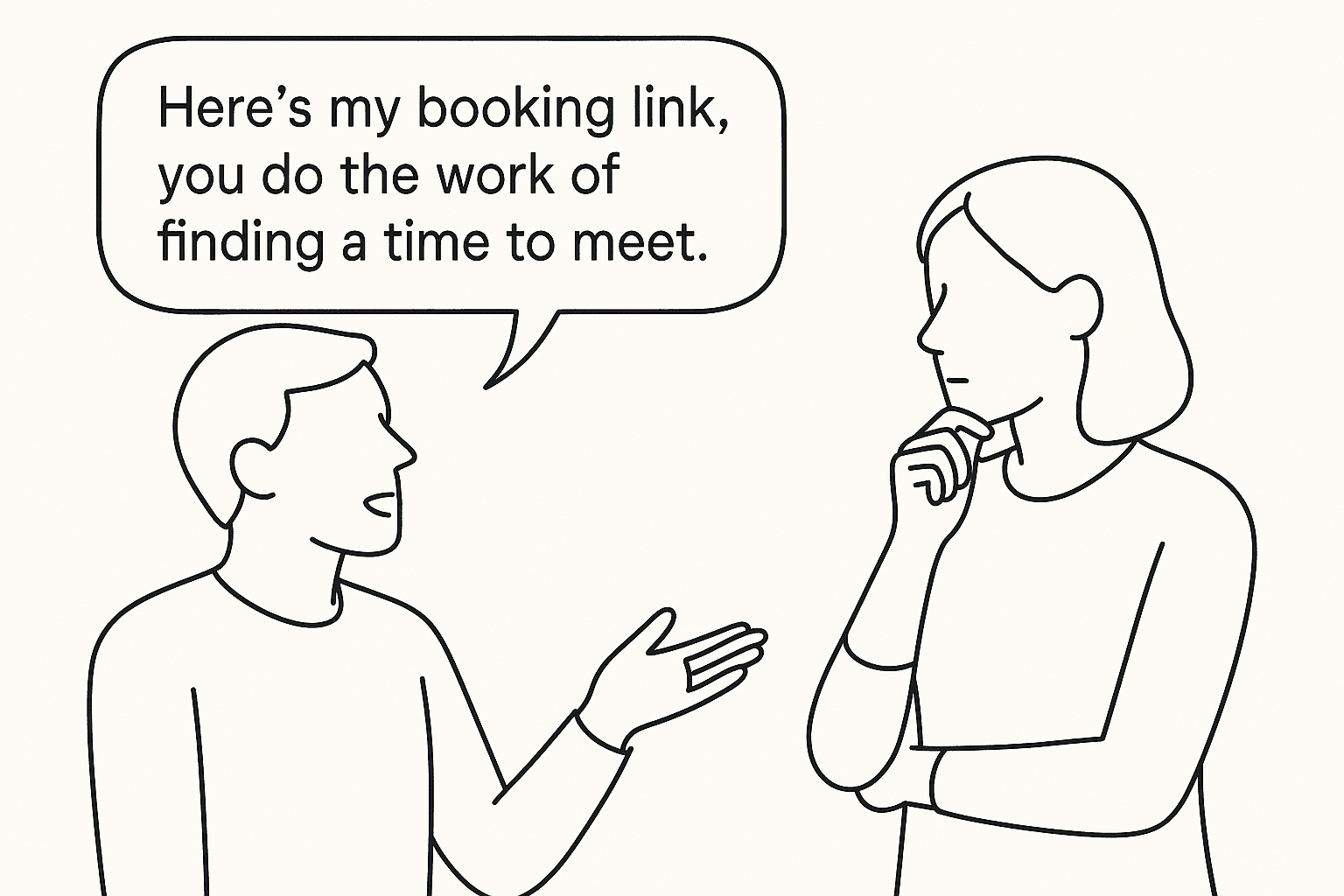
The Hidden Signal Your Booking Link Sends to Executives
Is a Booking Link the Right First Impression?
Imagine this: You're a founder, and you've been trying to connect with a key investor for weeks. They finally reply, and in their email, they include a booking link. You probably don't feel annoyed. In fact, you're excited. You immediately click the link and happily find a time that works.
But what if you're the investor? Or a CEO, or a senior executive? The psychology changes. In high-stakes, peer-to-peer relationships, a booking link can send a subtle, often unintended, signal. It shifts the work onto the other person, creating a less-than-ideal first impression.
This isn't about saving five minutes. It's about perception, and in important professional relationships, perception is everything.
The Unspoken Psychology of Scheduling
When you hand someone a booking link, you're essentially saying, "My time is more valuable than yours, so you figure it out."
While most people would never articulate this thought, they feel it. You've transferred a task to them: opening the link, comparing calendars, making a choice, and confirming.
This is perfectly fine for casual catch-ups or low-stakes meetings. It works great for a podcast interview, a quick coffee chat, or a user research call. In these situations, everyone is happy to prioritize convenience over formality.
But when you're fundraising, closing a sale, or connecting with an executive, the dynamic is different. These are moments where a transactional approach can seriously hurt you.
The "Human Assistant" Standard
There's a reason CEOs have executive assistants. The CEO could send a booking link, but they don't. The assistant handles the logistics. They don't push work onto the other person; they make their life easier.
When a board member asks for a call, their assistant doesn't send a link. They reach out, suggest times, and manage the back-and-forth. This feels respectful. It communicates a level of care and attention that a link simply cannot.
This is the social contract of professional scheduling: you never make the more important person do the work.
How AI Restores Professionalism
This is where AI scheduling assistants like Skej come in. Instead of forcing someone to go through a booking page, the AI does the work on your behalf. It joins the email, text or Whatsapp thread, understands the context, and finds a time that works for everyone.
An AI calendar assistant can book, follow-up, reschedule, or even scan a booking link for mutual availability without you lifting a finger. The other person never feels like they're being made to do the work. The interaction feels seamless and effortless. It’s like having an invisible assistant handle the tedious details for you.
This also sends a deeper status signal. High-status professionals often make things look effortless. Their calendars appear to run like a well-oiled machine, even though a lot of coordination happens behind the scenes.
When an AI assistant quietly handles your scheduling, you project that same signal of effortless professionalism. Meetings appear in calendars as if by magic. Reschedules happen without any friction. The person on the other end feels cared for, not processed.
The Future of Scheduling Is Human, But Not Human-Powered
Booking links were a major step forward a decade ago. They made scheduling self-serve and efficient. But in solving one problem, they created another by stripping away the personal touch that's essential in leadership and high-value relationships.
AI calendar assistants restore that balance. They offer the efficiency of a booking link while bringing back the professionalism of a human assistant. They make scheduling feel respectful, invisible, and smooth.
So, the next time you're about to send a link, pause and consider the psychology behind it. Is this a casual meeting where efficiency is the only thing that matters? Or is it a crucial relationship where professionalism and perception could define the outcome?
If it's the latter, let an AI do the work. Because the future of scheduling isn't self-serve; it's a service that feels human, without requiring a human to do the heavy lifting.
The Future of Professionalism Is Already Here
The old way of scheduling involved clunky back-and-forth emails, endless booking links, or the cost of a human assistant. But the highest-status professionals don't rely on any of that. They move meetings from idea to calendar as if by magic, and it's because they've found a better way.
That better way is Skej.
Skej is an AI scheduling assistant that works in your existing conversations in email, WhatsApp, and Slack. You never have to leave the thread. Just add Skej to the conversation, and it handles the rest. It finds the perfect time for everyone and sends calendar invites, providing a human-like experience that reinforces your professionalism and respect for the other person's time.
The future of scheduling isn’t self-serve; it's a seamless service that feels human without requiring a human to do the heavy lifting.